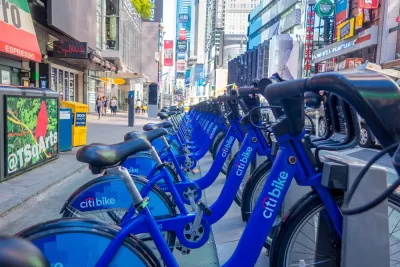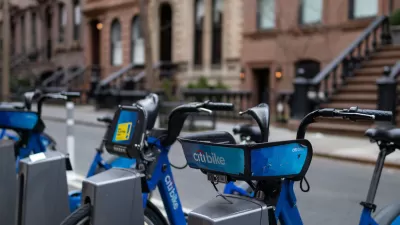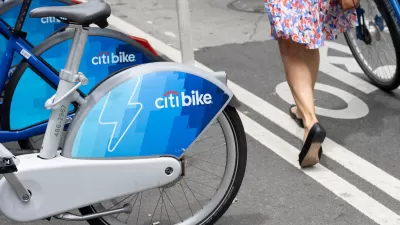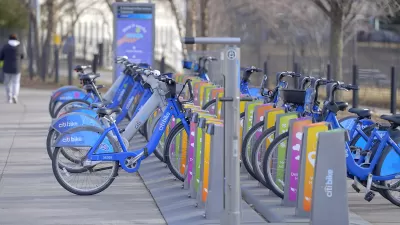The popular NYC bike share system will likely survive the company’s current financial setbacks, but other, smaller bike share systems may not be so lucky.

What does trouble at the company operating four of the top five bike share systems in the United States mean for shared bike systems and, more specifically, for New York City’s Citi Bike? Alissa Walker asks this question in Curbed, assessing how Lyft’s recent financial woes could impact U.S. bike share systems operated by the ride-hailing giant.
Walker describes the company’s history with bike share, starting with its acquisition of Motivate in 2018. “Lyft originally positioned its foray into bike share as part of building the ultimate multimodal-transportation app, bundling its ride-hailing services with bike or e-scooter rental or the ability to buy transit tickets.”
Now, with its financial future in peril, Lyft has killed some of its bike share systems altogether and increased prices in others. According to Walker, cities are once again looking at forming their own municipally owned bike share systems—a more common feature pre-Bird and Lyft—to limit the volatility and maintain service.
Walker predicts that “Even if Lyft starts making bike-share cuts in the name of cost savings, it’s unlikely New York City will see the same fate as Minneapolis,” where Lyft abruptly ended service last month. “Citi Bike — which has seen a 33 percent year-over-year increase in ridership so far in 2023 — also has the model that’s preferred by Lyft: an exclusive, multiyear, public-private partnership that Lyft says justifies infrastructural improvements and service expansions.” But the future may not be as bright for smaller cities who can’t afford the same level of commitment and funding.
FULL STORY: What Does the Potential Demise of Lyft Mean for Citi Bike?

Maui's Vacation Rental Debate Turns Ugly
Verbal attacks, misinformation campaigns and fistfights plague a high-stakes debate to convert thousands of vacation rentals into long-term housing.

Planetizen Federal Action Tracker
A weekly monitor of how Trump’s orders and actions are impacting planners and planning in America.

In Urban Planning, AI Prompting Could be the New Design Thinking
Creativity has long been key to great urban design. What if we see AI as our new creative partner?

How Trump's HUD Budget Proposal Would Harm Homelessness Response
Experts say the change to the HUD budget would make it more difficult to identify people who are homeless and connect them with services, and to prevent homelessness.

The Vast Potential of the Right-of-Way
One writer argues that the space between two building faces is the most important element of the built environment.

Florida Seniors Face Rising Homelessness Risk
High housing costs are pushing more seniors, many of them on a fixed income, into homelessness.
Urban Design for Planners 1: Software Tools
This six-course series explores essential urban design concepts using open source software and equips planners with the tools they need to participate fully in the urban design process.
Planning for Universal Design
Learn the tools for implementing Universal Design in planning regulations.
Gallatin County Department of Planning & Community Development
Heyer Gruel & Associates PA
JM Goldson LLC
City of Camden Redevelopment Agency
City of Astoria
Transportation Research & Education Center (TREC) at Portland State University
Jefferson Parish Government
Camden Redevelopment Agency
City of Claremont





























